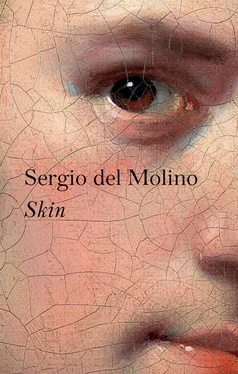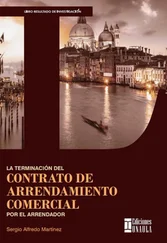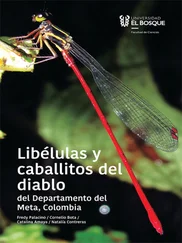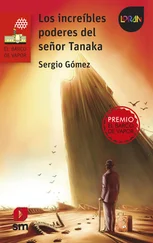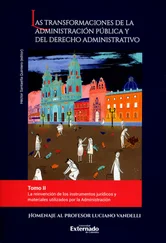But there’s something even more perturbing in this image of Stalin in the Sochi swimming pool. The broken surface of the water, knocking against the edges with every movement. This irresistible amniotic attraction. The torsion of the passing minutes, refracting when a person is submerged. When we bathe, we are all innocent. Whatever we may be out of the water we leave suspended, there beside our t-shirt, towel, sun cream and half-read novel. That was why Artyom didn’t see a tyrant. It wasn’t to do with the fact that Stalin was his father – ultimately every father is a tyrant to his children – but with the water and its way of making the bodies we see fused beneath the surface soft and shiny.
I know this in the way that such things are known, by having experienced them. When I think of Stalin in Sochi, I am really thinking of myself in another spa town, one we often spend a few days at in the summertime. Alhama de Aragón is one of these towns that became bourgeois in the nineteenth century, when it was newly fashionable among Madrid’s upper classes to go and take the waters. The result of that geothermal craze was a very beautiful grouping of buildings distributed across a park that gradually fell into disrepair over the course of the following century, until the socialist government sent all of Spain’s OAPs there for a price so ridiculous that it turned out to be more economical for them than staying at home. In the twenty-first century, the old ruins were restored and the dancehalls reopened, along with the restaurants with their sommeliers and the top-floor suites, but geo-thermalism’s social curse remained in the air like the formaldehyde that impregnates an autopsy room.
The spa has three hotels: the lower-class one, the middle-class one and the upper-class one. Although we’ve occasionally thought about staying in the upper-class one, we’ve always made do with the middle-class one. Out of stinginess. The lower-class one, where you have to go to fill out medical forms and sign up for treatments, has a smell about it of long waits and of nappies. Its hallways are populated by recipients of discount vouchers from the branch of Spanish social services that deals with the elderly; they shuffle about improbably on legs almost completely incapable of locomotion. You need to get in and out quickly, before one of them dies in front of you and ruins your weekend by making you spend it at the local magistrate’s, giving statements.
I try to pretend that the lower-class hotel and its inhabitants don’t exist. I already over-identify with illness and death in my day-to-day life; when I go on holiday, I want to feel more alive. This is the same reason I use the thermal baths, with their imitation-Roman vaults, hydro jets, plunge pools, and saunas. I also get a little tipsy after supper on the terrace, sometimes with jazz bands as entertainment, but above all make sure to don my dressing gown, walk through the park, and have a dip in the thermal lake, which surrounds an island with a grassy lawn on which the changing rooms and toilets stand, along with a bar that must actually have been a bar in Alfonso XII’s day but that is now used to store the deckchairs. Getting down there early, reserving two deckchairs near the water’s edge by placing a couple of towels on them, and plunging into the medicinal water which trickles out of the mountain at close to 30°C, is without a doubt one of the best things I have done in all my life.
In the time before we started going to Alhama, I spent a number of years not bathing in public places at all. I would refuse to go to the beach, and found a way to get out of anything involving swimming pools, rivers, lakes, or waterholes. At Alhama, the shame that had formerly forced me to watch from the shore, swaddled in trousers and long sleeves, went away. Perhaps because nobody at Alhama is beautiful and there aren’t any teenage boys around with Herculean torsos to intimidate me. Alhama, like all nineteenth-century spa towns, is an asexual scene where all monsters go unnoticed. Even so, the first time I went for a dip, it was a huge challenge to take off my t-shirt.
Come on, bashful, go for it, Cris said, always pushing me on, always forcing me to get past this fear of myself, which she sees as exaggerated and unjustified.
I’m going to read a little, I’ll go in afterwards, I said.
But she wasn’t having it. She virtually threw me in the water, or yanked me in, and I took my t-shirt off and dived in, more to avoid a scene – the old people from the lower-class hotel, like rheumatic sunflowers, were starting to turn and stare – than out of any conviction.
The moment I was in the water, I felt like Proust’s madeleine. Not Proust eating the madeleine, but the madeleine itself when it gets dropped in the tea and comes apart like a piece of origami thousands of pages long and filled with whole paragraphs of subordinate clause after subordinate clause. I, taking the form of cake crumbs, transformed into my own personal temps perdu , but, before I could arrive at the epiphany, dozens of fish arrived and started nibbling at me. Just like a madeleine, my psoriasis came away in little pieces, which they then devoured, fighting over the little flakes, as is the way with fish.
To begin with it felt nice being tickled like this, but the fish were in predatory mode, they weren’t spa attractions, and their attacks grew more and more violent. The largest fish, who took a little while to arrive because they lived out in the middle of the lake, did actual damage. I soon got tired of letting them do as they pleased, and swam around a little to drive them away. They were pretty dauntless, however, and it took more than a couple of swipes to deter them: they’d spent their entire lives sharing their living space with decrepit, harmless human beings. They weren’t like fish in the rivers or sea who have seen their friends pierced by fishing hooks and getting grilled for somebody’s supper a couple of hours later. The fish in the Alhama lake knew they are invulnerable, and kept up their pursuit of me. The moment I stopped moving, they assaulted me once more. I had to move my arms and legs constantly to keep them at bay.
This battery made the epiphany harder to come by, but not impossible; a little laboured, without the psychedelic fluidity of the truly epiphanic, and yet it arrived with a certain rhythm and pulse. My conversion into a madeleine culminated in a brief illustration of my bathing history, which was projected on my mind like the film with which people are presented in the moments before they die. My childhood on the beach, before and after the red dot on the sole of my foot. The lover’s sea off Biarritz, a number of landlocked ones too, vague hints of the north, high tides, low tides, a couple of rivers whose location I can’t recall and two or three Mexican sinkholes that were dark and exotic and smelled of shrimp.
You always step in the same stream. Every time we go underwater, we pick up on the pleasure where we left off. The decades or kilometres between one diving-in and the next are immaterial. Heraclitus must have been a very dry sort not to understand this. How are man and river going to change the second time around? In fact, it’s the exact opposite: no more emphatic proof exists of immutability than a list of the times a person has bathed or swum. There’s a group of gentlemen in San Sebastián who go for a dip at the La Concha beach every morning, whatever the weather. They do it as a way of mocking the weather, mocking their own old age, even mocking death. Every time they get in the water, they return to the first immersion. Past, present and future? Nothing but inventions on the part of people with all their clothes on – and not a splash of water. The same holds true for distances. Going swimming in Patagonia and going swimming in Norway means the same swim in the very same water. This is why explorers used to go off in search of the fountain of youth: they went looking for it in the water, the only place it can be found.
Читать дальше
